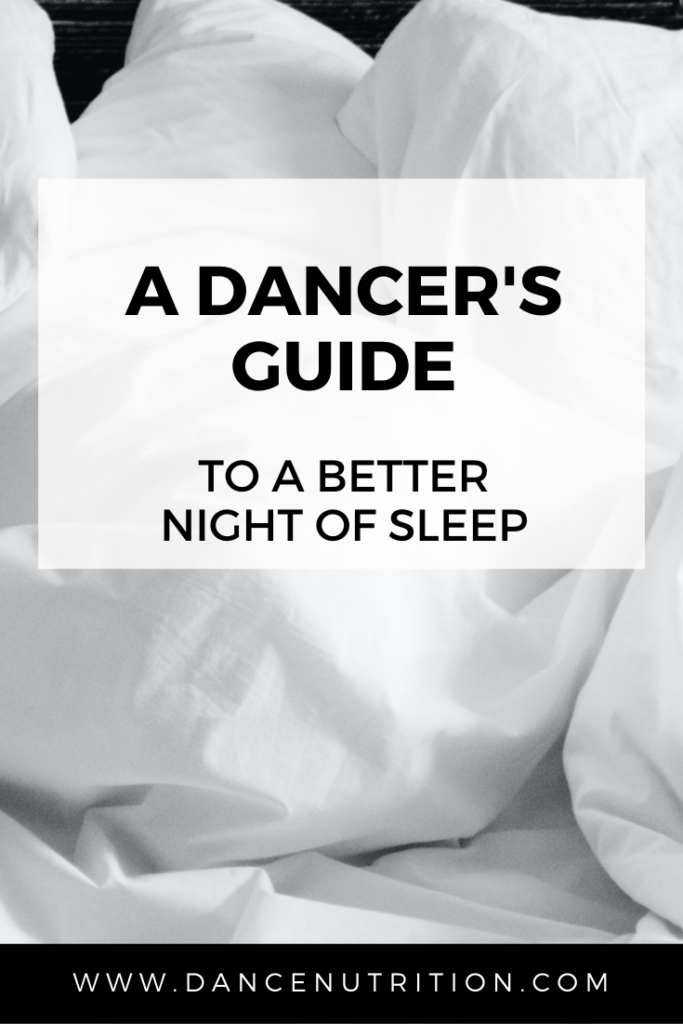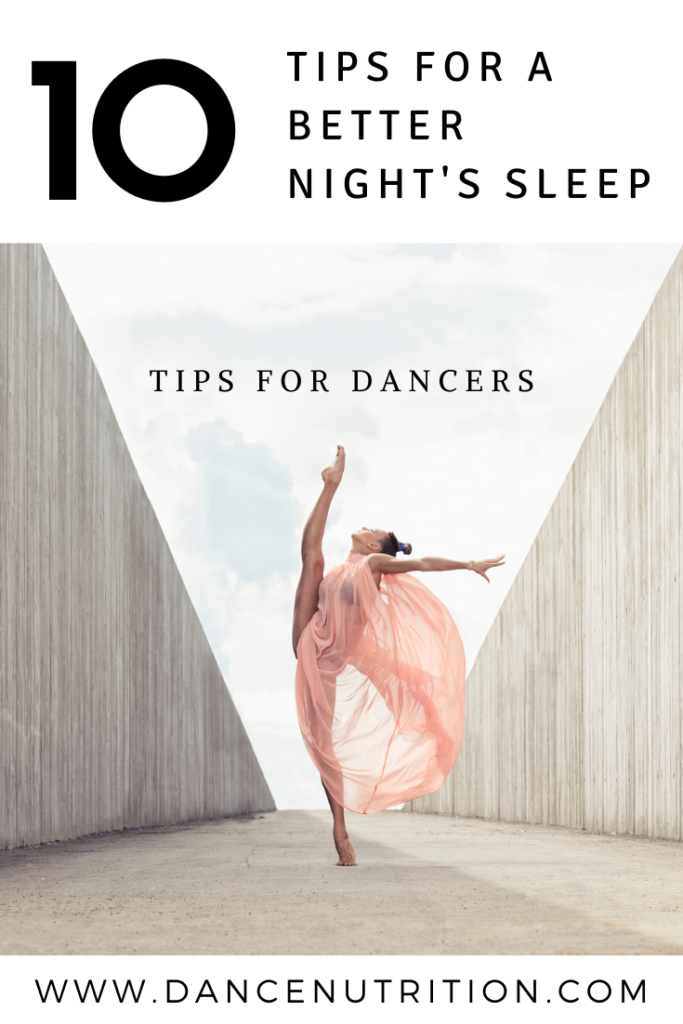The Healthy Dancer® focuses on how nourishment optimizes performance. Through the process, we recognize that nourishment extends beyond our plates with experiences that allow us to navigate life safely and healthfully— spending time with friends and family, engaging in other creative or academic pursuits, connecting with nature, and practicing self-care with activities like meditation. Aside from this are necessities like food, hydration, and sleep— the latter often taking a back seat to rigorous training demands like time spent in classes, rehearsals, and extra cross-training.
While you might be able to push through one or two poor nights of sleep, beyond that, a sleepless schedule can have a detrimental impact on your well-being. In this blog post, we’ll uncover considerations for healthy sleep patterns and strategies to implement for a better night’s sleep.
How Much Sleep Does A Dancer Need?
While non-dancers need at least 7 hours of sleep each night, an elite-level dancer who trains and performs up to 20 hours a week should aim for more— at least 8 hours to support optimal muscle recovery. For adolescent dancers, this goal becomes even higher at 10-12 hours per night.
Dancers can aim for these amounts in an ideal world, but busy dance schedules make sleepless nights the norm. Setting realistic sleep goals isn’t going to offer lasting support. Instead of focusing solely on the amount you’re sleeping each night, you can improve the quality of that rest.
What Defines Sleep Quality?
Two variables lay the foundation for measuring sleep quality:
- The amount of time one spends asleep in bed, and
- The amount of time it takes to fall asleep at night.
Optimal sleep quality lends itself to optimal mental, physical, and emotional functioning. While no single ingredient gives us better sleep quality, daily habits that are practical and accessible can significantly enhance our sleep quality.
Will my diet impact my sleep?
Mealtime habits are often speculated to impact sleep patterns— the types of foods and the amounts of food eaten before bedtime are examples. While no magic food exists to improve sleep, a few considerations can help.
As a stimulant, caffeine works by blocking the action of adenosine, a neurotransmitter responsible for promoting sleep and relaxation. By disrupting this natural process, caffeine can make it difficult to fall asleep and reduce the overall duration of sleep. While every dancer’s reaction to caffeine is different, if you feel sensitive you’ll want to drink caffeine-containing foods and beverages like dark chocolate, coffee, and tea long before bedtime. Click here to learn more about the impact of caffeine on dancers.
The question of meal timing also comes up in conversations around sleep. I’ve previously cautioned against diets like intermittent fasting for dancers— a plan that can hinder your ability to refuel and recover after an evening of dancing. Dancers who experience reflux can implement a few tweaks, but be weary of streamlining restrictive advice. Here’s an article that offers non-diet tips for managing reflux.
5 Steps To A Better Night’s Sleep
Here’s a comforting fact: we can work to improve your sleep quality without relying on restrictive patterns or expensive supplements. Consider a handful of daily habits that will help:
#1: Establish a consistent sleep schedule
This helps regulate your body’s internal clock, making it easier to fall asleep and wake up feeling refreshed. Aim to go to bed and wake up simultaneously every day. This is likely more manageable on weekdays. If you can continue this pattern on weekends, that’s great! If not, consider weekends a time to catch up.
#2: Create a relaxing bedtime routine
A relaxing pre-sleep routine to signal to your body that it’s time to unwind. This could include reading, journaling, gentle stretching, meditation, or listening to soothing music. If you’re squeezing homework into the mix, create a soothing environment alongside it. Candles and decaffeinated tea are personal favorites.
Perhaps even more important is to avoid stimulating activities during this time. Since you likely just returned from an afternoon of dancing, skip the late-night cross-training. As for electronics, the blue light emitted by screens can interfere with your body’s sleep-wake cycle. Limit exposure to electronic devices such as smartphones, tablets, and computers at least an hour before bedtime. If you must use screens before bed, consider using blue light filters or blue light-blocking glasses to minimize the impact on your sleep.
#3: Reconstruct your sleep environment
Keep your room cool, dark, and quiet to promote restful sleep. Invest in a comfortable mattress and pillows. Consider using blackout curtains, white noise machines, or earplugs to minimize disruptions from outside noise and light.
#4: Utilize functional fuel
Complex carbohydrates like whole grains contain tryptophan, selenium, and magnesium, nutrients to downregulate stress hormones (cortisol) and mediate sleep hormones (like melatonin). Nutrients like vitamin D may also help to regulate sleep. In addition to this are the benefits of an overall balanced plate. Consistent intake of foods rich in fat and protein will regulate blood sugar and satisfy you through the night. Rather than relying on expensive supplements, here are a handful of sleep-promoting bedtime snacks:
- Bananas with almond butter: Bananas are rich in magnesium and potassium.
- Yogurt with granola: Yogurt contains tryptophan while granola provides complex carbohydrates.
- Whole grain toast with cottage cheese: Whole grain toast provides complex carbohydrates and cottage cheese is a good source of protein and calcium.
- Herbal tea with a handful of walnuts: Herbal teas like chamomile or valerian root can have calming effects that promote sleep, while walnuts contain melatonin.
#5: Manage stress and anxiety
Practice stress-reducing techniques such as deep breathing exercises, visualization, or journaling to calm your mind before bed. If feeling overwhelmed, consider seeking support from a therapist or counselor.
10 Quick Strategies To Improve a Dancer’s Night Sleep:
From classes and rehearsals to homework and catching up with friends, squeezing in 8-9 hours of sleep into your schedule is challenging. Consider these minor daily adjustments to further the process:
- Turn off electronics 30-60 minutes before bedtime.
- Sip on your favorite non-caffeinated tea (Here’s my favorite)
- Read a chapter of a book.
- Add some high-magnesium foods to your day. Examples include almonds, walnuts, tofu, pepitas, whole grains, meat, and fruit.
- Get your fluids in earlier: needing to pee is a major contributor to nighttime wakings!
- Skip the dark chocolate right before bed—it contains stimulants caffeine and theobromine, which can leave you feeling more alert than calm.
- If your mind is racing, jot down tomorrow’s agenda on a Post-it.
- Eat enough throughout the day. Whether intentional or unintentional, under-eating will disrupt nighttime sleep. To learn more about whether or not you’re eating enough, click here.
- Meditate, even if it’s just for 5 minutes!
- Reset your internal clock and reduce daytime naps.




